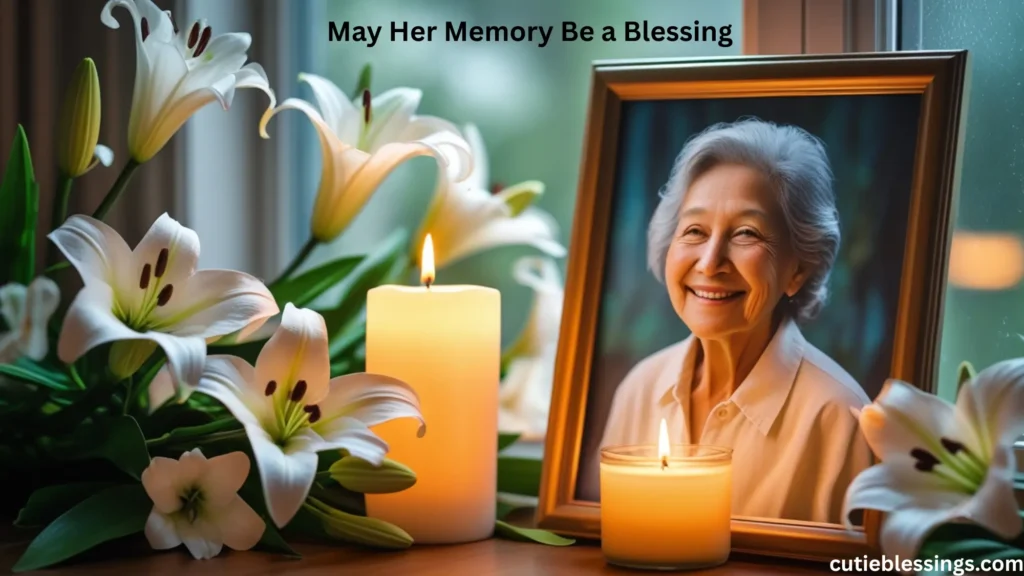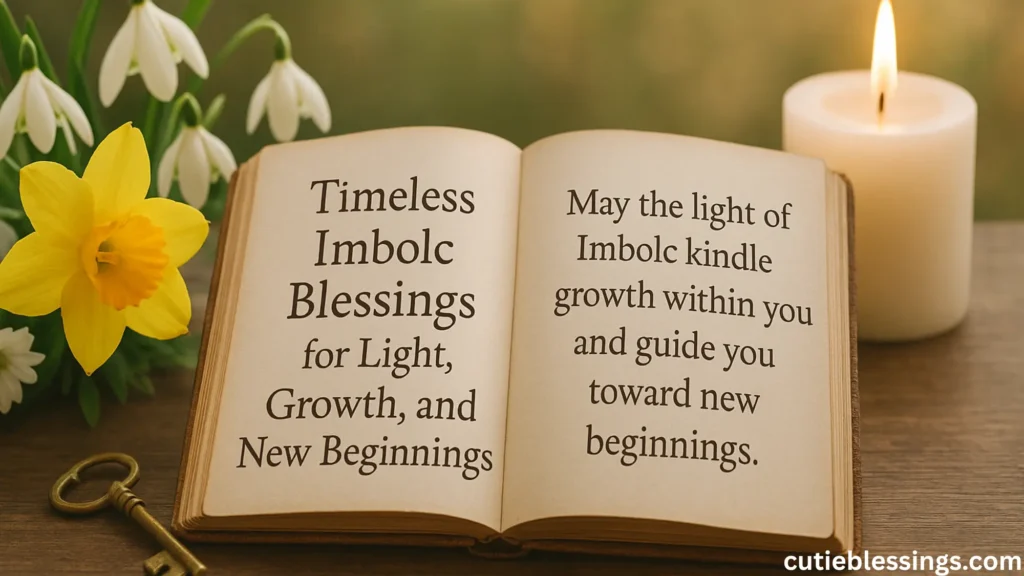Table of Contents
The Power of a Gentle Phrase
There are moments when words fail us — when loss enters our lives and silence feels safer than speech. Yet, amid that quiet, one phrase carries both comfort and reverence: “May her memory be a blessing.”
You’ve likely heard it at funerals, memorials, or in sympathy cards. It’s gentle, timeless, and somehow says everything that needs to be said without a single word wasted.
But what does it truly mean? Why does it touch people so deeply — across cultures, languages, and generations? And how can you use it meaningfully when someone you love is grieving?
Let’s explore the emotional, spiritual, and cultural depth behind this beautiful phrase — and how it can bring light, peace, and healing to both the speaker and the listener.
What Does “May Her Memory Be a Blessing” Really Mean?
At its core, “May her memory be a blessing” is a way of saying:
“May the memory of her life continue to inspire, comfort, and guide those who knew her.”
It’s not just an expression of sorrow — it’s a wish for transformation.
It acknowledges grief while gently shifting focus from pain to gratitude.
A Message of Continuity, Not Finality
While death may end a life, it doesn’t end love.
This phrase reminds us that memories — our stories, laughter, teachings, and love — live on in those left behind.
So when someone says “May her memory be a blessing,” they’re not simply offering condolences. They’re affirming that the departed person’s life had meaning, impact, and beauty that will continue to bless others.
The Origin of “May Her Memory Be a Blessing”
The phrase finds its roots in Jewish tradition, where it’s often said as “Zikhronah livrakha” (for women) or “Zikhrono livrakha” (for men).
The Hebrew Meaning
- Zikhronah / Zikhrono — “Her/His memory”
- Livrakha — “For a blessing”
Together, it forms a deeply spiritual sentiment: “May their memory continue to be a source of blessing and goodness in this world.”
In Judaism, memory isn’t passive — it’s active. To remember someone is to bring their light into the present. Their values, kindness, and lessons become part of how we live.
Over time, this phrase crossed cultural and linguistic borders. Today, people of all faiths use it to express love and remembrance in a way that feels both personal and universal.

When to Say “May Her Memory Be a Blessing”
This phrase fits naturally in any moment of loss — but also in moments of honor, reflection, or celebration of life.
Here are a few examples of when and how to use it gracefully:
1. In Sympathy Messages
When writing a condolence card or message, this phrase can add warmth and meaning.
Example:
“Your mother touched so many hearts with her kindness. May her memory be a blessing to all who loved her.”
It’s sincere, respectful, and comforting without feeling overused.
2. At Memorial Services
During a eulogy or speech, this phrase beautifully concludes a heartfelt tribute.
Example:
“She lived with courage and laughter. She left a mark that will never fade. May her memory be a blessing.”
This moment honors not just her passing — but the life she lived.
3. In Everyday Conversations
Sometimes, remembrance isn’t about ceremonies. It’s about simple, spontaneous reflection.
Example:
“I still make her cookie recipe every Sunday. May her memory be a blessing — she really did make everything sweeter.”
This casual yet heartfelt use keeps memories alive in daily life.
4. In Writing or Creative Work
Authors, artists, and poets often use the phrase in dedications, obituaries, or memorial writings.
It’s poetic, concise, and layered with emotion.
Example:
“For my grandmother, who taught me how to love unconditionally — may her memory be a blessing.”
Why the Phrase Feels So Comforting
We often struggle to find the “right” words when comforting someone in grief.
That’s why “May her memory be a blessing” feels like a small miracle of language — it’s gentle, respectful, and profoundly human.
Here’s why it resonates so deeply:
1. It Shifts Grief Toward Gratitude
Rather than focusing on loss, it focuses on what remains — love, lessons, and legacy.
It’s a reminder that every act of kindness we remember becomes a continuation of the person’s spirit.
2. It Honors Without Intruding
Unlike phrases such as “She’s in a better place,” which can feel assumptive, this expression doesn’t impose beliefs. It simply offers warmth and respect — universally understood.
3. It Invites Reflection
Every time it’s spoken, it encourages the listener to remember the good moments, the laughter, and the love that still lingers.
It turns mourning into remembrance, and remembrance into meaning.
The Deep Symbolism Behind “Blessing”
To call someone’s memory a blessing is to recognize that their existence made the world better — and continues to do so through the people they touched.
In many traditions, a “blessing” means something sacred, life-giving, and enduring.
So when we say “May her memory be a blessing,” we’re wishing that the memory doesn’t fade, but rather grows in value and significance with time.
Examples of How to Personalize the Phrase
If you want to make this phrase more personal or heartfelt, you can gently expand it while keeping its spirit intact.
Here are a few variations:
- “May her memory be a blessing and her light guide us always.”
- “May her memory be a blessing, and her love continue to inspire our hearts.”
- “May her memory be a blessing to all who were lucky enough to know her.”
- “May her memory remain a source of comfort and courage for you.”
- “May her memory be a blessing that reminds us how to live with grace.”
Each one keeps the integrity of the phrase while adding a touch of personalization and warmth.
How to Use “May Her Memory Be a Blessing” Respectfully
Because this phrase carries deep spiritual roots, it’s important to use it with genuine care and sensitivity.
Here are a few etiquette tips:
1. Mean It When You Say It
It’s not a filler phrase — it’s a blessing. Say it slowly, sincerely, and only if you truly wish comfort and peace for the grieving person.
2. Use It When Appropriate
It fits moments of remembrance or condolence — not casual or humorous situations.
3. Be Inclusive
While the phrase originates from Jewish tradition, it’s widely appreciated in interfaith and secular settings. You don’t have to be Jewish to use it; you only have to be kind and authentic.
Turning Memory into a Blessing: Practical Ways to Honor Loved Ones
Saying the phrase is beautiful — but living its meaning is even more powerful.
Here are heartfelt ways to make someone’s memory truly a blessing in everyday life.
1. Continue Their Traditions
Cook their favorite meal, play their favorite song, or visit a place they loved.
Small acts of remembrance keep their spirit alive.
2. Share Their Stories
Talk about them. Tell funny anecdotes, lessons they taught you, or how they changed your life.
Every story shared becomes a living blessing.
3. Give in Their Honor
Donate to a cause they cared about, or volunteer in their memory. Turning sorrow into kindness multiplies their legacy.
4. Create a Memory Space
A small altar, a photo corner, or a journal of memories — physical reminders help turn grief into gratitude.
5. Speak Their Name Often
When we continue to say their name, we give them presence — not just in memory, but in spirit.
A Look Across Cultures: How Others Express the Same Sentiment
Every culture has a way of blessing the memory of those who’ve passed.
While the words differ, the heartfelt intention remains the same.
| Culture/Tradition | Common Phrase | Meaning |
|---|---|---|
| Jewish | “Zikhronah Livrakha” | May her memory be a blessing |
| Christian | “Rest in peace” / “Eternal rest grant unto her” | A prayer for her soul’s peace |
| Muslim | “Rahimahallah” | May God have mercy on her |
| Hindu | “Om Shanti” | May her soul find peace |
| Secular/Modern | “She will live on in our hearts” | Her legacy endures through love |
Though phrased differently, all express the same universal truth:
That love, once shared, never truly ends.

The Emotional Psychology Behind the Phrase
Psychologists note that rituals of remembrance — like saying “May her memory be a blessing” — play a powerful role in emotional healing.
1. It Validates Grief
The phrase acknowledges loss without minimizing it. It says, “Yes, this hurts — and yet, her life mattered.”
2. It Encourages Positive Reminiscence
By focusing on blessings, it helps the grieving person reframe their memories with warmth instead of despair.
3. It Creates Emotional Continuity
It bridges past and present — allowing love to remain active rather than frozen in loss.
So, beyond being poetic, this phrase actually helps the healing process — both emotionally and spiritually.
When You Don’t Know What to Say — This Phrase Helps
Many people fear saying the wrong thing when someone loses a loved one.
They worry about triggering more pain or sounding insincere.
That’s where “May her memory be a blessing” becomes invaluable.
It’s elegant, simple, and universally comforting — making it one of the best phrases to use when words feel impossible.
You don’t have to elaborate. Just saying it softly, from the heart, can mean more than any long condolence speech.
How This Phrase Can Inspire Your Daily Life
You don’t have to wait for loss to appreciate the power of remembrance.
The essence of “May her memory be a blessing” is a call to live in a way that becomes a blessing to others.
Imagine if we all lived with the intention of leaving behind beautiful memories — kindnesses, laughter, love, and generosity — that others could someday remember as blessings.
So while it’s a phrase for the departed, it’s also a quiet invitation for the living:
“Live a life so full of love that when people remember you, they’ll say — may her memory be a blessing.”
Examples from Real Life (Inspired by True Stories)
Example 1: A Mother’s Recipe
After her mother passed, one woman continued baking her mother’s famous apple pie every Thanksgiving.
“Every time the house fills with that scent, I feel her with me,” she said.
“May her memory be a blessing — in every bite.”
Example 2: A Teacher’s Legacy
A retired teacher’s students organized a scholarship in her name.
“She changed hundreds of lives,” one student said.
“May her memory be a blessing to every student who walks this path.”
Example 3: A Friend’s Laughter
At a celebration of life, a friend said,
“We can still hear her laughter echoing through our memories. May her memory be a blessing that keeps us smiling.”
These real-life examples show how remembrance transforms from sorrow into love, from pain into peace.
What It Means Spiritually
Spiritually, “May her memory be a blessing” bridges the gap between this world and the next.
It suggests that while the person is gone physically, their spirit continues to act through those they’ve touched.
In essence, the phrase acknowledges immortality through influence — that the soul lives on in the goodness it inspired.
It’s a statement of hope — a belief that love never truly dies; it simply changes form.
Common Misunderstandings
Some people think this phrase means “rest in peace” or is purely religious.
But in truth:
- It’s not a command; it’s a wish — a heartfelt hope for ongoing blessing.
- It’s not exclusive to any religion; it’s a universal gesture of reverence.
- It’s not about the afterlife; it’s about how we carry someone’s legacy forward on Earth.
So whether you’re religious, spiritual, or secular, you can use it with authenticity and warmth.
Writing It Beautifully: Examples for Cards and Tributes
Here are a few elegant examples to inspire your writing:
Condolence Card:
“May her memory be a blessing and her love continue to surround you always.”
Funeral Program:
“Her laughter, kindness, and light will forever be remembered. May her memory be a blessing.”
Memorial Post:
“Today we honor a beautiful soul. May her memory be a blessing and her spirit live on in all she touched.”
Gravestone Inscription:
“Beloved mother, sister, and friend — may her memory be a blessing.”
Final Reflection: Living the Blessing
The beauty of “May her memory be a blessing” lies not just in what it says — but in what it inspires.
It invites us to remember with love, to speak with gentleness, and to live with purpose.
It reminds us that blessings aren’t just something we receive — they’re something we become through how we live, love, and leave this world.
So the next time you say this phrase, pause for a moment.
Feel the truth behind it.
Let it fill the space between grief and gratitude.
Because in the end, when someone’s memory becomes a blessing — it means their life was a masterpiece of love.
Conclusion:
“May her memory be a blessing” is more than words of comfort.
It’s a timeless reminder that even in loss, love endures — transforming memories into light, sorrow into peace, and silence into strength.
Each time we remember someone with love, we turn their memory into a living blessing.
And that’s perhaps the greatest way to honor a life well lived — by allowing it to keep blessing others, one gentle memory at a time.
You can also read: The Shocking Truth Behind Count Your Blessings Not Trouble
FAQs:
1. What does “May her memory be a blessing” mean?
It’s a heartfelt wish that a loved one’s memory continues to inspire and comfort others.
2. Is this phrase only for Jewish traditions?
No, it is widely used across cultures and faiths to express remembrance and respect.
3. When should I say “May her memory be a blessing”?
During grief, memorials, sympathy messages, or moments of honoring a loved one.
4. Can I use this phrase for men as well?
Yes, for men the phrase is “May his memory be a blessing,” carrying the same sentiment.
5. How can I make someone’s memory a true blessing?
By continuing their traditions, sharing stories, and performing acts of kindness in their honor.



